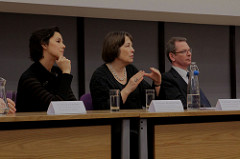by Sarah Hearne
Universities around the world have recognised that there is a dearth of women in STEM. In various countries actions are being taken in an attempt to address this. In the UK and Ireland the Athena SWAN scheme has proven popular and is starting to have an impact. Buoyed by its success, Australia has recently begun its own scheme, modelled on Athena SWAN, called SAGE (Science Australia Gender Equity). Currently a pilot scheme, it involves universities and scientific research organisations from around the country who have two years to develop an Athena SWAN Bronze Award application.
I have attended various “Women in STEM” events over the years, the most recent of which was the formal launch of the launch of my university’s Athena SWAN program. All of these events have been insightful, inspiring and educational. And all these events have been predominantly attended by women. Even in this most recent event, where the good attendance by men was noted, they accounted for a mere 20% of attendees1.
Beyond the low interest by men in increasing the number of women – and by extension, increasing diversity in general – in STEM, I have noticed a concerning theme: Men seem to feel the need to justify their interest. It’s not enough to care that 50% of the human race are being systematically disadvantaged due to nothing more than their gender, they rationalise their support through some ‘personal’ connection to the issue. Commonly, they cite the fact that they have wives, daughters, or granddaughters that are or will be affected. Every man who has explained the source of their interest has begun with something along the lines of ‘now I have daughters I see how big a problem sexism is and I want to make things better for when they get older’.
This is a noble sentiment and one that should be applauded, but what concerns me is that I’ve not once seen a man stand up and say that their interest comes because they have a son. Where are the fathers concerned about whether their sons will have just as much involvement in their own children’s lives as their partners, or who worry their sons will feel pressured to take a job that is high paying but unfulfilling, simply because men are supposed to be the breadwinner. I certainly have never heard a man stand up and say they’re interested in diversity simply because it affects them in some way. Or that they have obligations outside work that mean they can’t work late, or need to unexpectedly take time off, or simply want a work-life balance that may not be tolerated when you’re on the top rungs of the career ladder.
Until men start seeing this as an issue that affects them just as much as women I don’t see how we are going to make any meaningful changes. Men are limited just as much by societal constraints and expectations as women, just in different ways. Men are expected to work instead of look after their children, which means that they miss out on many important events in their child’s life. It means that they feel unable to take career choices that may be rewarding but are not seen as ‘masculine’ enough. It means that their mental health suffers when they don’t feel they meet society’s expectation of what it means to be a man, but because ‘real men don’t cry’ they suffer in silence, the result of which is that men are far more likely to commit suicide than women.
Another issue that comes from assuming this is a ‘women’s issue’ is that the emphasis is placed on getting women into traditionally male roles. I am all for this, but I am also all for getting more men into traditionally female roles. By solely focusing on getting women into ‘male’ fields we are implicitly (and sometimes explicitly) saying that this is where the worthwhile jobs are to be found. Don’t be a nurse, be a doctor. Don’t be a PA, be a manager. Without a commensurate push to get men into traditional women’s roles all we are saying is that women who want to be successful should be more like men. And this leads to yet more problems…
Anyone who is interested in sexism in the workplace will know of all the ways women ‘jeopardise’ their careers. They only apply for jobs when they meet all the criteria, unlike men who will apply when they only meet some; they are timid negotiators so end up with lower salaries than men who are more aggressive negotiators; they don’t speak up in meetings, perhaps because they are interrupted more, so their ideas are not heard as often. The solutions given are, whether explicit or not, to essentially ‘be more like the men’. Improving these skills is not necessarily bad advice, but the reasoning behind it is. It’s saying that the male way is the best way and if you want to be the best then you need to be like a man. But why? Why do we think that men have got it right about everything? Why not challenge this assumption and see if it stands up to scrutiny?
Getting women into STEM subjects is, to a large extent, a pilot study for a bigger project which is to increase diversity in all its myriad forms and in all fields of endeavour: gender, race, sexual orientation, physical and mental diversity. It is hoped that if workplaces can ‘crack the nut’ of sexism then the lessons learned and the schemes implemented will apply just as well to these other areas. However, by focusing on a uni-directional flow of women into male-dominated fields we are only looking at half the picture. To create true equality of opportunity we need to include men. We need to ask why there aren’t many male PAs, male nursery school teachers, male care-home assistants, male nurses and what we can do to make these roles more attractive to them. For one thing, if all the women are off working in STEM who’s going to do the jobs they’ve left? But, more seriously, working out how to get women into well-paid prestigious roles is the easy bit, getting men to work in ‘women’s’ jobs is the hard part. If we can work out how to fix that problem, then we may be onto something.
1 I counted 16 men and 65 women. My counts may be off by one or two people due to my view being blocked but I was sat at the back so had as good a view of the room as was possible as an audience member.

